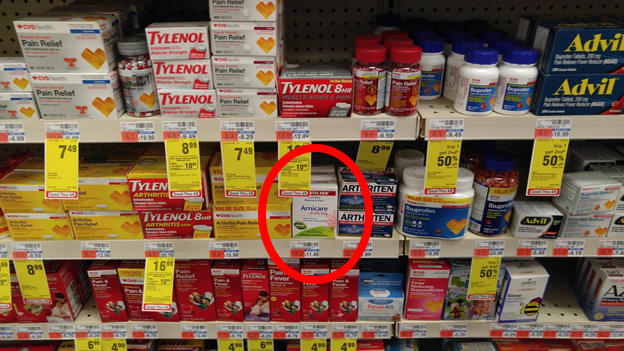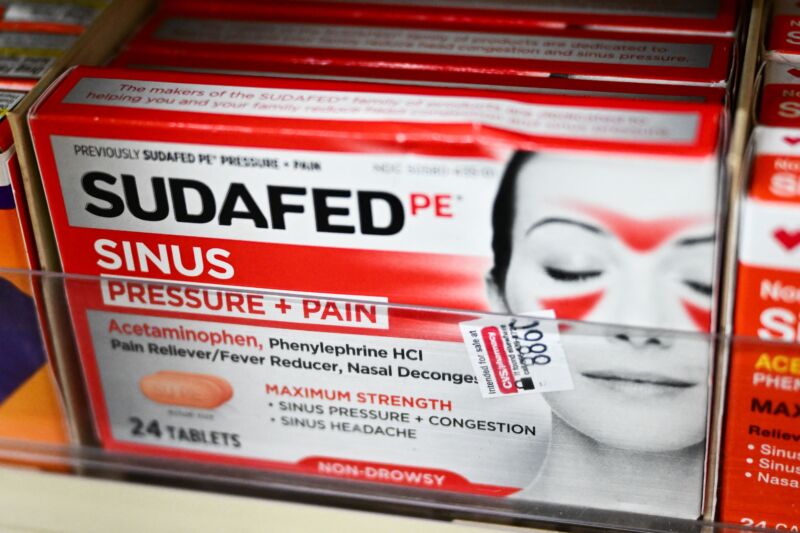Pharmacy giant CVS revealed late last week that it is voluntarily removing some cold and flu medications from its shelves because they don’t work, while many other ineffective products remain on shelves. .
CVS’s decision comes after a Food and Drug Administration advisory committee voted unanimously last month that the common decongestant phenylephrine is ineffective in treating a blocked nose. But this comes ahead of action by the FDA itself on the vote, which will likely lead the agency to revoke phenylephrine’s approval, ultimately.
In a statement to Ars, a CVS spokesperson suggested that the FDA advisory committee’s vote was the impetus for the change, but that it would “follow FDA guidance.”
“We are removing a small number of oral decongestant products containing phenylephrine as the sole active ingredient from CVS Pharmacy stores, but we will continue to offer many other oral cough and cold products to meet consumer needs,” the statement said. from CVS. It did not provide additional details on which or how many products would be removed, or when the removals would be completed.
Removing phenylephrine products from pharmacy shelves is a victory long sought by researchers and consumers. Since at least 2007, researchers have expressed doubts about the effectiveness of phenylephrine, found in popular oral medications with brand names such as Sudafed, Mucinex, Nyquil and Benadryl. The small studies from the 1960s and 1970s that formed the basis of the FDA’s initial approval in 1976 turned out to be seriously flawed. And three large clinical trials since 2007 showed the drug didn’t work. Pharmacological studies have shown why: phenylephrine is extensively metabolized in the intestine, with less than 1% of the active drug remaining bioavailable. Consumers, meanwhile, were largely in the dark, spending nearly $2 billion in 2022 on these products that researchers have said for years don’t work.
But while these useless medications are finally disappearing from CVS shelves, there remains an entire class of products that are just as useless: homeopathic products.
Snake oil left
These fake treatments are based on centuries-old pseudoscience and have been repeatedly proven to be no more effective than a placebo. In fact, if they prove effective, it would upend fundamental scientific knowledge. For decades, consumer advocates and watchdog organizations have denounced these products, yet these products are readily available on the shelves of every major pharmacy.
Homeopathy is based on two false ideas: the “law of like”, in other words “like cures like”, meaning that a substance that causes a specific symptom in a healthy person can treat conditions and diseases in a sick person presenting this same symptom; and the “law of the infinitesimal,” which states that diluting a supposedly healing substance makes it more effective in treating medical conditions. So homeopathic products often begin with bizarre, sometimes toxic substances that end up being diluted into oblivion during ritual procedures. The result is simply water or inactive filler ingredients. Homeopaths have recognized this and sometimes retort that water molecules have a “memory” of substances (this is not the case).

A homeopathic product lurking on a CVS shelf alongside real medications.
Finance
Does this seem absurd? It is. And yet, homeopathic products are not only available in major pharmacies and retailers across the country, they are often sold on the same shelves, alongside evidence-based medications that have undergone rigorous safety evaluations and of effectiveness by the FDA.
The FDA has the authority to regulate homeopathic products. But, based on the Food, Drug, and Cosmetic Act of 1938, homeopathic products are generally considered exempt from FDA premarket safety and effectiveness reviews, provided the ingredient active be included in the homeopathic pharmacopoeia, a published list of substances approved by homeopaths. . As such, homeopathic products enter the market without any FDA review and remain on shelves with FDA-approved, evidence-based medications.
“Most people don’t know what it is,” Nicholas Little, vice president and legal director of the consumer advocacy organization Center for Inquiry (CFI), said of homeopathic products in an interview with Ars.
#CVS #drops #cold #medicines #FDA #advisers #unnecessary
Image Source : arstechnica.com

